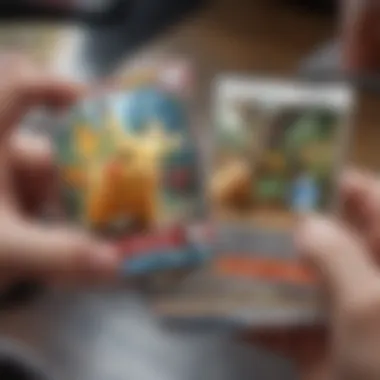Local Strategies for Selling Your Pokémon Cards Effectively


Intro
Selling Pokémon cards can be both an enjoyable process and a task that requires careful consideration. As the popularity of Pokémon cards continues, trading and collecting has grown considerably. Many collectors are eager to evaluate how to market their cards locally. In this guide, we will provide nuanced details on local avenues for selling Pokémon cards, exploring various options like game stores, online platforms, and community events. Understanding where and how to sell can significantly impact the value received for your collection.
Local Game Stores
Local game stores are often the cornerstones of gaming communities. They are not just places to buy cards; they also organize events where collectors and players gather. Many stores offer trade-in programs. This interests plenty of individuals looking to upgrade or sell their unnecessary cards. Before you approach a store, ensure you do your homework. Assess your collection. How much are the cards worth based on their condition and rarity? Having a well-informed outlook will empower your selling decisions. It also builds credibility with store owners or staff.
Online Marketplaces
Today, the internet has opened up numerous avenues for selling cards. Websites like eBay and TCGPlayer allow you access to a broader audience. Listing on these platforms can provide better prices in many situations, but mind the fees associated with each transaction. Clear photographs, accurate descriptions, and considering the timing of your listing can all enhance your chances of success. Listing cards promptly after a set release or during peak trading seasons is typically advantageous.
Conventions and Community Events
Another excellent opportunity lies in conventions and community events dedicated to Pokémon and other trading card games. These gatherings can often be profitable for sellers. Not only do you connect directly with potential buyers, but the environment also retains enthusiasm about trade. If attending an event, bring your Pokémon cards and be prepared for negotiations. It’s beneficial to gaze into trends in prevailing prices beforehand.
Evaluating Card Value
Understanding card value is vital before attempting to sell. Factors include the demand, condition, and rarity of the cards. A simple approach is to consult pricing guides available online or use mobile applications tailored for card trading. These tools can assist in positioning your collection competitively. Taking updates on current trends in rare cards' pricing assists you in determining partnership rates, thereby preventing loss.
Finale
Understanding the Pokémon Card Market
Understanding the Pokémon card market is fundamental for anyone looking to sell their collection. This knowledge helps sellers to make informed decisions and avoid potential losses. When collectors engage with the market, they should recognize key factors that shape pricing and demand. Knowledge about historical sales provides context, while an understanding of current trends can influence a seller's strategy. Additionally, grasping the subsets of the market, including variations in culture and interests, allows for better-targeted selling approaches.
Historical Context of Pokémon Cards
The Pokémon card game debuted in 1996, coinciding with the growing popularity of the Pokémon franchise. Initially aimed at children, the cards gained a unique collector's appeal over the years. Early cards, often referred to as the
Assessing Your Pokémon Card Collection
Assessing your Pokémon card collection is crucial before embarking on the selling journey. Proper evaluation influences not just the selling price but also which local avenues to consider. Identifying valuable cards can mean the difference between a successful sale and an underwhelming experience. A focused assessment helps you understand what you possess.
Additionally, the card market varies widely. Certain cards may attract attention in specific local outlets, while others might perform better online. Knowing your collection's strengths allows for targeted efforts when selecting a selling option.
While emotions often tie directly to collectibles like Pokémon cards, keeping a rational approach can serve well. Gather detailed information. Check prices, condition, and desirability to make informed decisions.
Identifying Rare and Valuable Cards
Recognizing Different Rarities
Recognizing different rarities plays a substantial role in the ease of selling your cards. Each rarity level corresponds to a specific value proposition in the Pokémon market. The basic levels range from common to rare, with cards from special editions often more sought after. Knowing a card’s rarity helps categorize its significance.
Common cards are about mass production, while rare ones had limited printing. They are often the centerpiece of trading. Having a detailed grasp of rarity contributes to accurate pricing. If a seller is aware of the rarity, presenting it effectively enhances potential sales. A unique feature often involves holographic or promotional cards. These elements can shift perceived value immensely session.


Understanding Grading Systems
Understanding grading systems is also integral for valuation. Cards often get assessed by a third-party grading service, determining their quality and, in turn, their price. A well-graded card fetches significantly more than one not evaluated or graded. Probably, an example is a Gem Mint 10 rating, which represents a pristine card, highly sought after by collectors.
This awareness minimizes risks of inaccurate value assessments. Knowing how cards are graded becomes a well-rounded criterion when selling in local venues. However, grading can incur additional costs and time delays. Effective usage often means planning before gauging profitability.
Condition Evaluation of Cards
Factors Influencing Card Condition
Factors influencing card condition are vital. Elements like wear and tear visibly alter a card’s status. A few factors include bending, scratching, and discoloration. Care in handling directly defines how well cards sustain over time. Each factor thus impacts the selling ability dramatically.
For example, a card with minor flaws still retains value but aiming for cards in Mint condition is considered optimal. Cards regularly exposed to light often fade, causing depreciation. Thus, making informed decisions about storage sustains potential worth. Higher inventory of pristine cards equates higher confidence when engaging with potential buyers.
Proper Card Storage Techniques
Proper card storage techniques secure your investment and help maintain conditions. Ideally, setting cards in card sleeves or hard cases counters environmental impacts. Investment into protective materials is routine for serious collectors.
Notably, different local retailers may share insight on effective storage solutions. Charting segments for value tracking while receiving specialized care guides the longevity of your collection. Guarding carefully from light, moisture, and direct handling almost appears mandatory.
Being aware of proper storage methods enhances the confidence in presenting cards for sale. On a cautious note, overexposure during transport could lead to unwanted damages, reducing perceived quality upon sale. At each point, understanding the card’s standing assures potential customers of its value.
Local Options for Selling Pokémon Cards
Game Stores and Specialty Shops
Finding Nearby Game Stores
Identifying local game stores is crucial. Such establishments tend to be aware of the Pokémon card market and often cater specifically to fans. Whether through social media groups, Google Maps, or Pokémon community boards, getting informed about where these stores are located can be particularly beneficial. Many game stores offer a welcoming environment where you can engage with both store owners and fellow collectors. However, one disadvantage is that not all shops offer the same level of expertise or recognition of valuable cards.
Checking Store Policies on Card Sales
Reviewing a store’s policies on buying Pokémon cards is essential. Each store likely has its unique rules. Some may offer cash, while others provide store credit. Familiarizing yourself with these variances can increase satisfaction with your sales process. For instance, some stores limit card sales to certain days, while others may have specific criteria for purchasing cards, making attention to this element significant. Still, restrictions could mean slower sales processes when working with store policies.
Community Events and Conventions
Participating in Local Conventions
Joining local conventions serves multiple purposes. Conventions are rarely just about trading; they merge elements of competition, networking, and enjoyment of the Pokémon fandom. Displaying cards at a convention helps to attract passionate collectors. However, coordinating participation can take effort and sometimes might lead to unpredictable attendance numbers. Nevertheless, most attendees are often enthusiastic, opening pathways to lively interactions.
Networking Opportunities at Events
Networking is a critical aspect of community events. Chances for meaningful conversations can arise organically during such interactions. Engaging with other attendees permits discussions where collectors exchange assorted market insights or even trading strategies. Although sometimes overwhelming with large crowds, the relationships developed here can lead to improved transactions in the long run. Still, consider making connections might require assertive engagement from your end.
Flea Markets and Trade Shows


Locating Local Flea Markets
Finding nearby flea markets can add a unique edge to selling your Pokémon cards. Broudly diverse, flea markets provide varied customer bases and on-the-spot connections. Unlike set retail environments, bargaining is often quite common here. Often, however, there can be fluctuations in buyer interest varying highly from week to week, potentially affecting the outcome of your sales efforts. Researching member reviews can help in pinpointing which markets could be most favorable.
Setting Up a Booth for Sales
Creating your own booth has both upsides and downsides. Owning physical space encourages personal branding and interaction with your audience. A tailored display attracts specific collectors while displaying your detailed knowledge of the cards. Such setups can sometimes require extended set-up time and may come with unexpected fees for booth rentals. However, your personal touch can effectively capture buyer interest larger events may not allow.
Online Platforms for Selling Pokémon Cards
Online platforms have transformed the way collectors trade Pokémon cards. Many enthusiasts seek to buy or sell cards without traditional constraints. The ability to reach a global audience is significant. By utilizing these marketplaces, sellers can maximize exposure and potentially increase their sales.
Marketplaces Like eBay and TCGPlayer
Creating Listings Effectively
Creating effective listings is crucial for success on platforms like eBay and TCGPlayer. Sellers must craft listings that catch a buyer’s attention. One key characteristic is the use of high-quality images. Images enhance trust and perspective about card condition. Listings should also contain detailed descriptions, specifying the card's rarity and any grading details.
A beneficial choice for sellers is structuring these listings to highlight keywords. These remain vital for search visibility. Sellers can monitor successful listings from other users, learning common practices that yield results.
Another factor to keep in mind is pricing strategy. Setting the right price precedes effective selling. Too high may discourage buyers; too low attracts unwarranted interest from speculators. Understanding these elements significantly contributes to achieving desired sales and maintaining seller credibility.
Understanding Fees and Shipping
Understanding fees and shipping policies is vital for navi-gating online marketplaces. eBay, for instance, imposes listing and final value fees. These fees can reduce profit margins. Knowing these costs means sellers can set prices accordingly to avoid unexpected losses.
Shipping aspects include packaging practices as well. Proper packaging not only secures cards during transport but also reflects professionalism. Choosing carriers has unique advantages and disadvantages as well. For instance, some carriers provide tracking, while others may be cheaper but less reliable.
Shipping time frames also affect buyer satisfaction. Understanding how to balance fee structures with effective shipping practices helps give the buyer confidence in their purchase.
Social Media Groups and Forums
Social media presents novel avenues for trading Pokémon cards. Platforms such as Facebook and Reddit host various trading groups tailored for enthusiasts. Engaging in these forums allows sellers to connect with audiences just as passionate. The environment encourages interaction and negotiation, which can lead to favorable outcomes.
Engaging in Trading Groups
Engaging in trading groups presents sellers direct access to avid collectors and competitive traders. This option effectively sparks reciprocal relationships within communities centered on shared interests. A prominent benefit lies within establishing direct communication.
Members often share valuable insights as well, such as pricing strategies or the legitimacy of trading partners. While these groups can present viable opportunities, exercising caution is equally essential in engaging interactions.
Best practices ensure that traders cultivate reliability amongst group members while navigating deals.
Assessing Trustworthiness of Buyers
Assessing the trustworthiness of buyers on social media can sometimes verge on challenging. However, some characteristics can assist. First, evaluate members’ engagement behaviors, such as frequency of postings and prior experience shared with others.


Feedback systems often help gauge a buyer’s reputation as well. Regularly assessing these social signals enhances protected exchanges among users. While social media engagement may outweigh some traditional outlets, further awareness helps diminish potential disappointment.
As social trading—though practical—possesses incidental risk and demands observation, learning this section elevates interactivity without compromising on safety. Social selling requires scrutiny; comprehension of buyers fosters advantageous trading postures for effective transactions.
Licensing and Legal Considerations
Understanding licensing and legal aspects is crucial when selling Pokémon cards. This section highlights important considerations that can help protect sellers, ensure fairness, and maintain the integrity of sales transactions. Also, it provides a level of confidence for collectors and traders regarding their rights and obligations.
Understanding Copyright and Ownership
When dealing with Pokémon cards, it is imperative to recognize the concept of copyright. The designs, artwork, and branding associated with these cards are often protected under intellectual property laws. This means sellers cannot create reproductions or play on the original art without permission from the copyright holders, which in this case is usually The Pokémon Company. To avoid infrigning copyrights, it is prudent to only sell original cards and resell licensed merchandise that clearly indicate proper permissions.
This is significant because it ensures that the collectibles maintain their value and legality. Selling cards with unauthorized prints can lead to legal action from copyright holders. Furthermore, understanding ownership boundaries helps clarify to whom the rights belong, especially in cases of inheritance or gifting. If individuals aren't clear on these rights, it might lead to disputes which can have financial consequences.
Tax Implications of Selling
The act of selling Pokémon cards is not just a hobby; it can have tax implications that deserve serious consideration. In many regions, earnings from selling collectibles may be subject to income tax. Collectors should keep a clear record of their transactions, tracking their sales and any costs associated with purchasing the cards. This includes purchase price, upgrades, condition enhancements and other related expenses.
The concept of capital gains tax also comes into play. If you've owned a card for an extended time and it appreciates in value, you might have to pay taxes on the profit generated from that sale. Failure to report these earnings may lead to consequences, such as penalties or fines.
In summary, awareness of legal aspects like copyright and taxation create a responsible attitude towards selling Pokémon cards. Keeping thorough records and understanding rights can prevent issues later. The knowledge in this area can empower sellers to partake in their sales ventures with confidence.
Always consult a tax professional to ensure compliance with local regulations when selling any type of collectibles.
Moreover, it is a good approach to remain informed about the specific rules in your area concerning e-commerce and local retail sales. Different jurisdictions may have unique requirements you must comply with when running both online and face-to-face transactions.
Final Thoughts on Selling Your Pokémon Cards
Selling your Pokémon cards is not just about the transaction; it reflects your dedication as a collector or trader. Highlighting the final thoughts on this matter is important as it provides a wrap-up to everything discussed. Understanding how to approach selling involves navigating bexpensive markets and worthwhile transactions. It also involves insights on the aftereffects of sales.
Evaluating Options Post-Sale
After completing a sale, you might find yourself asking, "What now?" Evaluating post-sale options becomes that critical next step. Take time to evaluate the revenue gained from your sales. This revenue could be reinvested in seeking rare cards that you wish to attain, or it could simply serve as additional funds for your hobbies.
Furthermore, understanding the selling process is likewise crucial. When you effectively examine the experience, it contributes toward better strategies for future sales. If you sold cards at a local game store compared to online platforms, consider the merits and flaws of either approach.
Engage with your own philosophy of collecting. Ask if your next steps lead deeper into collection or possibly even enjoyment of trading rather than accumulating?
- Reinvest revenue wisely. It can help whether it goes into future trades or other hobbies.
- Assess the method used. Learn from your experiences.
Ultimately, clarity comes from measuring trends and evaluating how sales impacted your personal collecting goals.
Potential for Future Collecting and Trading
One of the great elements after selling Pokémon cards is the potential for continued growth in both collecting and trading. The move from selling can encourage broader understanding. You learn not only about what sells well but also about new interests among the community. Insights gathered can direct your future decisions towards upcoming series or even variations of existing cards.
It is also important to consider the evolving market landscape. While current trends may determine today's value, they can change rapidly. Keeping an eye on these things engage you more actively in future collections or trades. Selling does not have to mean bidding farewell to your interest; motly, it can open new doors.
- Return to collecting with fresh insights. Understanding past cards might aid future purchases.
- Regular trading opportunities. There are continually shifting trends prompting frequent event organizing in local areas.
By analyzing what you wish to collect, you regain clarity not only about cards but about bolstering engaging collaborations with fellow traders.
Closing the section with these thoughts emphasizes the cyclical nature of selling, as it can kick-start your savvier presence in both collecting skies and trading sessions. Your journey does not end here; it merely begins another phase. Stay engaged to capitalize on all avenues.



